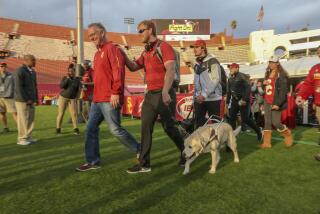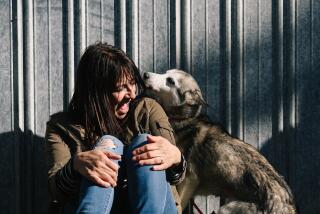Canine Guidance
- Share via
SUNLAND — He’s been her movie companion, work sidekick and dinner date at fancy restaurants. He’s grocery-shopped with her, tagged along on a whale-watching excursion and dutifully slept each night at her bedside.
But now, after a year of being Helen Kridel’s constant companion, Aero, a 15-month-old golden retriever with “soulful eyes” and a toothy smile, is getting ready to leave home.
Together, Kridel and Aero have been a duo with a purpose. Now their work as volunteer trainer and guide dog-in-training is nearly complete.
“It’s an experience . . . that will be part of me forever,” Kridel said recently.
The 47-year-old Sunland resident and mother of two grown children was seeking companionship when a friend introduced her to the idea of foster-parenting a guide dog.
Her busy schedule working full time as a caseworker at Glendale Adventist Hospital wouldn’t get in the way because the more exposure a dog-in-training has, the better.
“He’s grown up here,” Kridel said of her now 78-pound “puppy.”
Doctors, nurses, administrators and patients alike all know Aero. He’s so familiar, he even has his own hospital ID badge--complete with bite marks. A walk down the hallway with him could delay you a half hour or more. Everyone loves to stop and pet Aero.
Recently, while Kridel did paperwork, Aero snuggled under her desk--his nose nuzzling her slip-on shoe. Later, the two did rounds: Kridel talked with a patient about insurance while Aero waited patiently at her feet.
“He really perks up my day,” said Janet Patterson, a hospital data manager. “As much as we hate to see him go, he’s going to be great for a blind person. It’s for a good cause. We’ve got to keep that in mind.”
Kridel’s task has been to familiarize Aero with the ordinary and extraordinary sights and sounds of life: riding in an elevator, boys on skateboards--even resisting popcorn kernels on movie theater floors. In short, she’s taught a dog to not behave like a dog: no ball-chasing, no leg-lifting, no snapping at food scraps, no chasing cats. Once Aero’s in his official yellow guide dog vest, he’s working.
According to guide dogs of America, a nonprofit organization based in Sylmar, the cost to raise a guide dog is about $25,000. While the organization pays for veterinary bills, it is volunteers--such as Kridel--who do the rest.
“Without our puppy-raisers, we couldn’t do it,” program coordinator Louise Henderson says. “They are the heartbeat of the organization.”
The outfit matches about 230 newly graduated guide dogs to blind masters each year. The service is free and has a waiting list of about six months.
But Kridel’s greatest challenge is yet to come.
This spring she’ll return Aero to Guide Dogs of America to complete his training. If he passes a battery of tests, he’ll be matched with a blind applicant somewhere in the country.
“It’s going to be hard on him, too,” Kridel said. “He’s going to have to love what he’s doing. It’s got to be his choice and what he was put on this earth for.”
*
If Aero passes, Kridel will probably miss Aero’s “hugs” the most. That’s the time he puts his front paws on her lap and looks at her longingly for a pat on the head or a squeeze around his neck.
“You don’t really know love until you give it away, and that’s what I’m going to do,” she said. “I’m going to give away love. Boy, I’m sure going to miss him.”
For information on Guide Dogs of America or to learn more about the puppy-fostering program, call (818) 362-583.
*
Personal Best is a weekly profile of an ordinary person who does extraordinary things. Please send suggestions on prospective candidates to Personal Best, Los Angeles Times, 20000 Prairie St., Chatsworth 91311. Or fax them to (818) 772-3338. Or e-mail them to [email protected].


